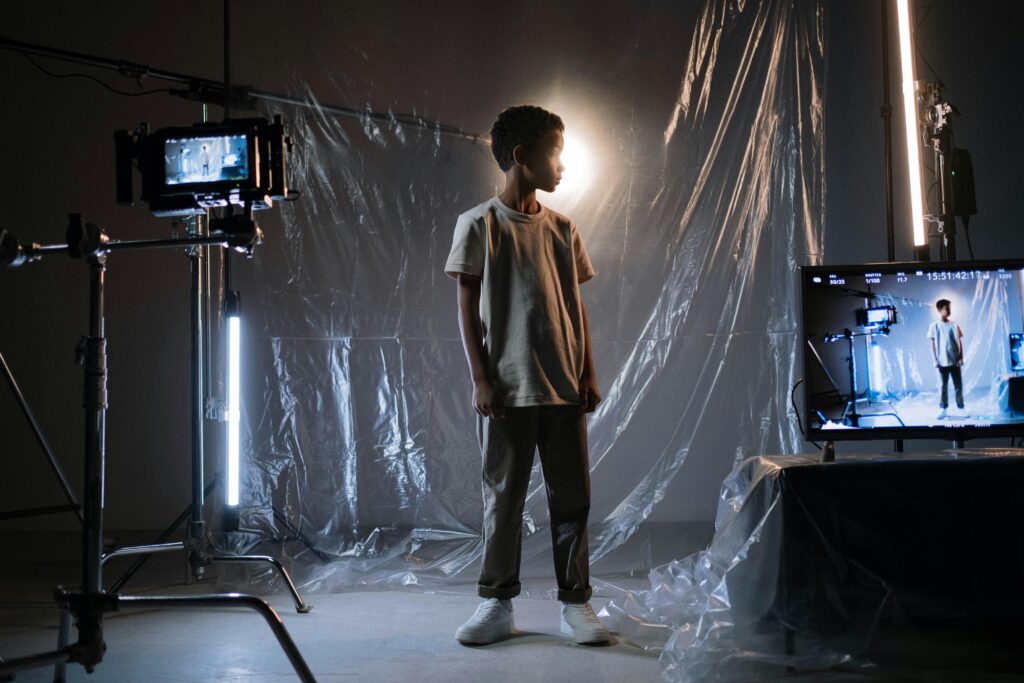The entertainment industry, known for its glitz and glamour, has long been hiding a dark reality: the sexual abuse and exploitation of children. From predatory practices to trafficking and manipulation, young talent often faces dangers behind the scenes that go unnoticed. Joseph Bonner’s article, “Special Rapporteur on a study on the sexual abuse and exploitation of children in the entertainment industry,” brings this issue to the forefront. At Screencheck, we believe it’s essential to shed light on these abuses and take meaningful steps toward protecting children in the industry. Our work revolves around ensuring safer environments for young performers, which requires systemic change to both policies and practices.
The Scope of the Issue
The statistics are alarming, with studies showing that one in four girls and one in six boys will experience some form of sexual abuse before they turn 18. The entertainment industry, with its constant need for fresh young talent, only increases the risk of abuse. Children drawn into the pursuit of fame often find themselves vulnerable to exploitation by individuals who prey on their hopes and dreams. Traffickers use promises of success and stardom as bait, but their true intentions are far more sinister. Instead of offering a safe and supportive environment, the industry can sometimes be a place where children are manipulated, abused, and trafficked.
This exploitation is often hidden in plain sight. Traffickers lure children through false auditions or contracts, preying on the dreams of families hoping to see their children succeed in the spotlight. These manipulative practices continue because the industry often lacks the transparency and accountability needed to prevent them. At Screencheck, we believe a crucial first step is ensuring that anyone involved in the recruitment of talent, from casting agents to talent scouts, has undergone proper vetting. Preventing exploitation begins with making sure everyone who works with children has been properly screened.
Why Is Mandatory Screening Essential?
The stories shared by survivors, such as Corey Feldman, Elijah Wood, and Rose McGowan, help shine a light on these hidden dangers. Their courage in speaking out about their experiences exposes the ongoing culture of abuse and the systemic issues within the industry that allow it to persist. These survivors have made it clear: the problem is not just a few isolated incidents, but a broader issue that requires urgent attention and reform. It is critical that we not only listen to these voices but take action based on their experiences to create a safer environment for future generations.
While we understand the depth of the issue, it’s also vital that we focus on practical solutions. The entertainment industry needs to implement stronger regulations to protect children, and that starts with a clear and enforced system for background checks. It’s essential that every person involved in a production—whether talent, crew, or management—undergoes comprehensive screening. This would ensure that those in positions of power have been properly vetted and have no history of abuse or misconduct.
At the same time, the industry needs to establish mandatory reporting systems. Such systems would make it easier and safer for victims or witnesses of abuse to report incidents without fear of retaliation. For these systems to work effectively, there also needs to be independent oversight bodies to enforce these standards and investigate allegations. Only through thorough, transparent processes can the industry begin to rebuild trust and ensure the safety of young performers.
Regular Background Screenings Aren’t Enough
However, preventing abuse is only part of the solution; survivors also need strong support systems to help them heal. This includes access to trauma-informed care, counseling, and other psychological services. Screencheck believes the entertainment industry must collaborate with mental health professionals to provide this support, as well as legal assistance for those seeking justice. Ensuring that survivors are fully supported in their recovery is vital to breaking the cycle of abuse and helping them rebuild their lives.
Key Steps Toward Reform:
To address child sexual abuse and exploitation in the entertainment industry, there are several critical steps that need to be taken:
- Create independent oversight bodies to monitor compliance with child protection standards, ensuring that all allegations are investigated promptly and thoroughly.
- Implement thorough background checks for all personnel working with children, including talent, crew members, and recruiters. These checks should encompass criminal history and allegations of past misconduct.
- Establish mandatory reporting systems to ensure that suspected abuse is reported immediately, with clear, accessible channels for victims and witnesses.
Wrapping Up
Ultimately, it is clear that change is urgently needed. The entertainment industry must adopt stricter policies, implement more effective background checks, and create a system of accountability that protects young performers from abuse and exploitation. By working together—government bodies, industry leaders, non-profits, and the entertainment community—we can ensure that future generations of talent are not subjected to the horrors that have been allowed to persist for far too long. At Screencheck, we are committed to this cause and stand ready to help lead the charge toward creating a safer and more transparent entertainment industry.
Disclaimer
This article is based on the work of Joseph Bonner, publisher of Court Magazine, and the findings presented in the “Submission: Special Rapporteur on a study on the sexual abuse and exploitation of children in the entertainment industry.” The allegations and conclusions drawn in the original study are not our own and remain the intellectual property of the author and the respective study. The views expressed in this article reflect Screencheck’s perspective on the topic, informed by the study’s findings, and are intended to foster discussion and action toward the protection of children in the entertainment industry. All rights to the original study and content are held by Joseph Bonner and related parties.

